Corpus Christi, TX Pollen and Allergy Report for Summer 2023
Pollen Allergy Trends in Corpus Christi, TX
When is pollen lowest in Corpus Christi, TX?

February
Lowest month total PPM
Avg. PPM
When is pollen highest in Corpus Christi, TX?

March
Highest month total PPM
Avg. PPM
How does pollen in Corpus Christi, TX compare to Texas?
Corpus Christi has a higher average PPM than the state of Texas.
Corpus Christi yearly avg PPM:
Texas yearly avg PPM:
How does pollen in Corpus Christi, TX compare to the USA?
Corpus Christi has a higher average PPM than the USA.
Corpus Christi yearly avg PPM:
USA yearly avg PPM:
Is pollen worse this year in Corpus Christi, TX?
Spring 2023 was worse than spring 2022.
Spring 2023 PPM:
Spring 2022 PPM:
Average PPM in Corpus Christi, TX
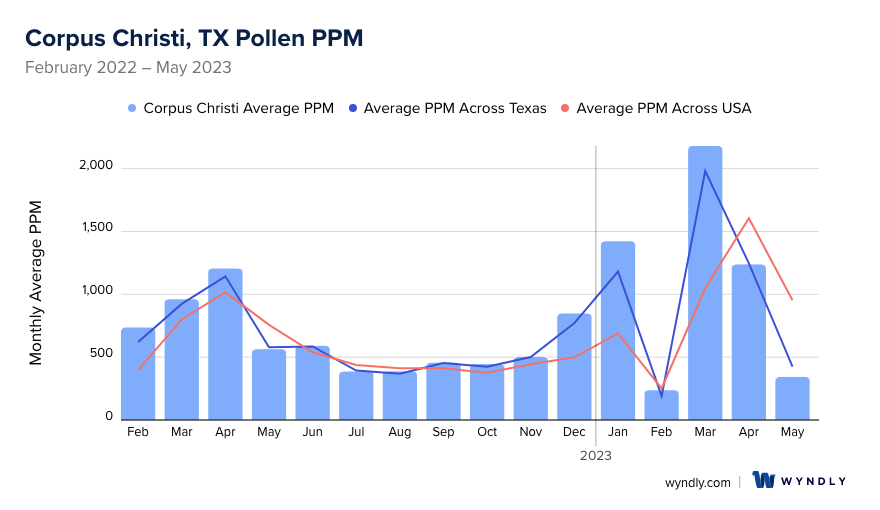
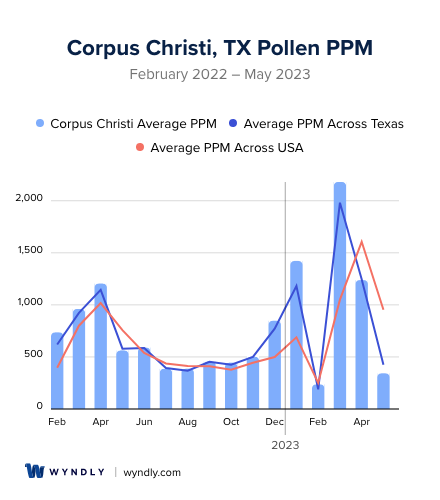
Corpus Christi, TX Pollen and Allergy Breakdown by Month
Grass
When is grass pollen highest in Corpus Christi, TX?
February has the highest grass pollen in Corpus Christi, TX with an average PPM of
When is grass pollen lowest in Corpus Christi, TX?
December has the lowest grass pollen in Corpus Christi, TX with an average PPM of
Tree
When is tree pollen highest in Corpus Christi, TX?
March has the highest tree pollen in Corpus Christi, TX with an average PPM of
When is tree pollen lowest in Corpus Christi, TX?
July has the lowest tree pollen in Corpus Christi, TX with an average PPM of
Weed
When is weed pollen highest in Corpus Christi, TX?
December has the highest weed pollen in Corpus Christi, TX with an average PPM of
When is weed pollen lowest in Corpus Christi, TX?
February has the lowest weed pollen in Corpus Christi, TX with an average PPM of
Corpus Christi, TX Pollen Monthly Breakdown by Pollen Type
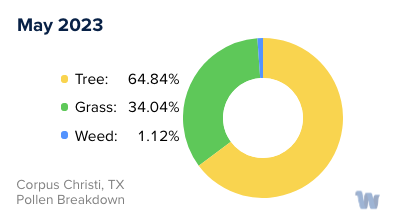
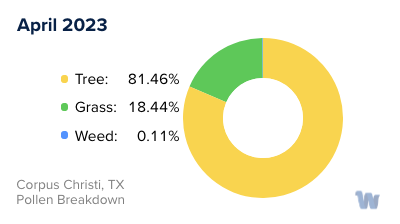
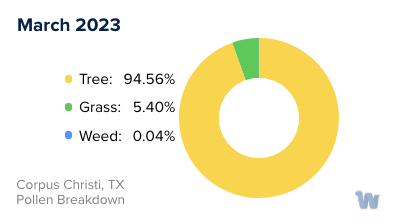
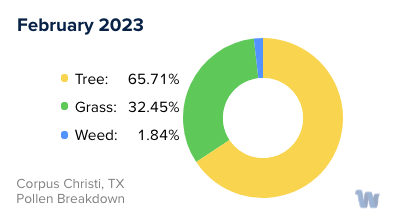
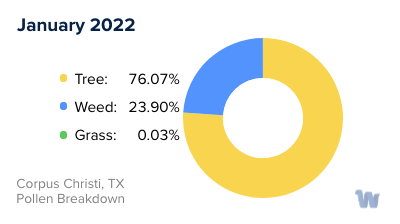
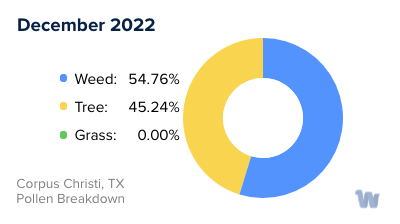
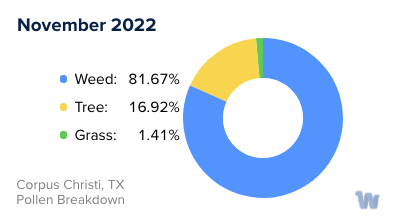
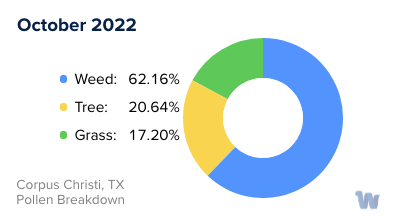
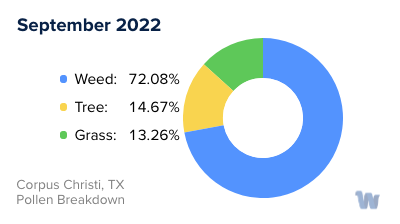
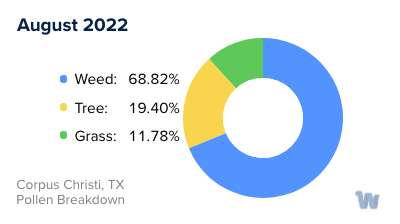
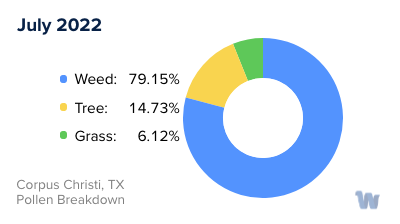
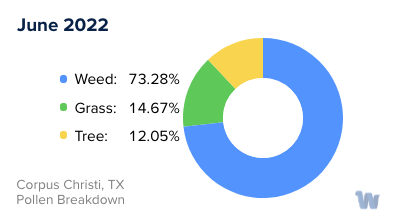
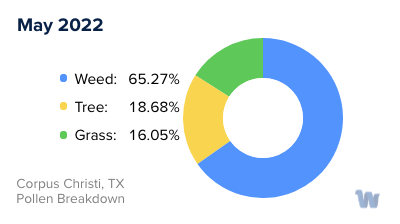
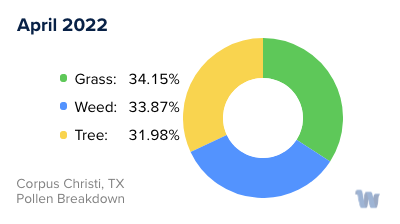
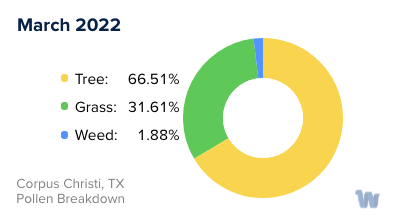
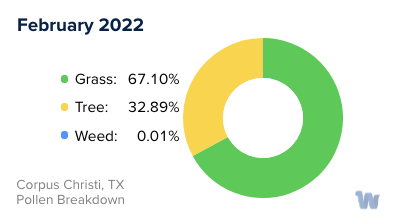
Pollen and Hay Fever in Corpus Christi, TX
Pollen allergies, often referred to as hay fever, are a significant concern for residents of Corpus Christi, Texas. The state's warmer climate encourages the growth of many pollen-producing plants, making coastal cities like Corpus Christi no exception to allergy troubles. Corpus Christi's subtropical climate, characterized by short, mild winters, enables various trees and plants to grow year-round. As a result, allergy sufferers often find little relief in the winter, a time when cooler climates experience a halt in pollen production and spread.
One of the main culprits of pollen allergies in Corpus Christi is tree pollen. The allergy season for tree pollen begins in early spring and extends well into the summer. During this time, many different trees produce pollen, which is typically spread by the wind, causing allergies to flare up across the region. Oak trees, in particular, are a common cause of these allergies, with their pollen often visible as a yellow dust coating cars and outdoor furniture. Other tree species that contribute to the pollen count include birch, elm, pine, pecan, and hickory.
As spring gives way to summer, grass pollen becomes a prevalent allergen. Activities like mowing the lawn and moving through tall grasses can disturb grass pollen, triggering allergy symptoms. Among the native grasses in the area, big bluestem and broomsedge are known to cause allergy problems.
As summer wanes, ragweed pollen takes center stage. Ragweed is a common allergen not just in Texas, but across the United States. Astonishingly, a single ragweed plant can produce up to a billion grains of pollen in a single season. Ragweed season typically commences in mid-August and extends through October, sometimes persisting into November.
In summary, Corpus Christi's year-round growing season and diverse flora result in multiple pollen seasons, each characterized by different types of pollen. This continuous cycle of allergens can make life challenging for those with pollen allergies, emphasizing the importance of awareness and preparedness.


